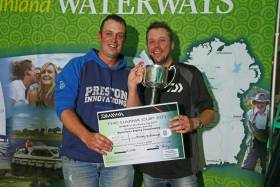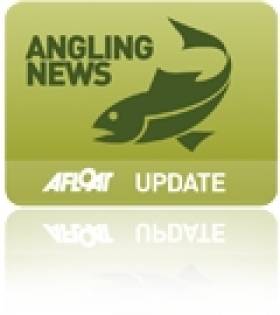Displaying items by tag: World Pairs Angling Championship
Victory For Festival Experts At World Pairs Angling Championships
#Angling - 2016’s runners-up Michael Buchwalder and Rod Scott scooped the €10,000 prize and the prestigious title at the Lakelands & Inland Waterways World Pairs Angling Championships
They were among 55 angling pairs competing in the cross-border event staged on inland waterways over the counties Leitrim, Fermanagh and Cavan from 4-8 September, showcasing some of the best wild fishing Ireland has to offer.
The increased number of participants from Europe — with anglers from Belgium, Germany, Lithuania, the Netherlands, USA, UK and Ireland — enjoyed a week full of hybrids, perch, roach and bream in Ireland’s north west.
Irish festival regulars Michael and Rod, having moved into the lead on day two, held their position all week as they showed their world-class fishing skills.
Rod, who was introduced to Irish match fishing at an early age by his father Mal, who created a series of popular festivals in Northern Ireland, said there are just two matches for him: the Waterways Classic and the World Pairs.
He added that it was “the best feeling ever” to have won the latter. He complimented his partner Michael, as he described how it’s all the duo talk about, and they were “over the moon” to have won the title having come so close last year.
Elsewhere in the competition, consistent fishing throughout the week from Dean Barlow, and then a top match weight of 29.500kg of bream and skimmers on the feeder from Steve Fleming, saw the Drennan-backed duo move into the top ten on day four. They held on to finish as runners-up, taking home the €5,000 prize.
German regulars Thorsten Beil and Rudiger Hansen finished in third place and collected €2,500 in a sensational conclusion to the competition.
Fishing for a prize pot of €20,650, the annual competition is played out in the Lakelands region in a selected one-hour zone from Killadeas to the north onLower Lough Erne, following through to Lough Scur on the Shannon-Erne Waterway in Leitrim in the south.
The five-day event, which sees anglers fish a different venue every day, has renewed interest in the natural fishing available in Ireland by showcasing the challenging angling available among fabulous scenery.
This has contributed to a reported increase in the numbers on the Irish match scene, through a massive social media following in Europe.
This is wild angling, and in order to reach the best that Cavan, Leitrim and Fermanagh have to offer, transport is provided to bring anglers to their pegs over rough terrain, or on boats seeking island stretches in the mighty loughs.
Running the event across the border is an important feature of the competition for title sponsors Lakelands & Inland Waterways, the tourism brand owned by Féilte Ireland and Waterways Ireland.
While the event attracts the world’s elite pole and feeder anglers fishing in pairs, it’s also a match for anglers of all abilities thanks to the inclusion of the Daiwa Cup and £10,000 sponsorship in tackle and vouchers from Daiwa Sports UK.
This year’s holder of the Daiwa Cup is Michael Buchwalder, with a solo weight of 73.060kg over the five days. Michael takes home the prestigious Daiwa Cup along with £1,000 prize money and a tackle voucher to the value of £1,500.
To ensure everyone gets a look-in, a tackle voucher prize of €300 was awarded to those with the best weight by rotation, but who had not made the top ten of the Daiwa Cup. This helps to gives a good share of winnings all round.
Staff from Daera Inland Fisheries Group provided on-the-ground support throughout the competition, with Inland Fisheries Ireland assisting with the draws to help run the event at a high level of professionalism. This ensures that everything runs smoothly for the visiting angler.
The event this year shared a buzz across the counties, with the opening taking place in Drumcoura City, Ballinamore, Co Leitrim, and closing at the Killyhevlin Hotel in Ennsikillen, Co Fermanagh.
The organisers thank all who took park, the fisheries for their services throughout the week, Ballinamore Tourism Group who provided stewarding services on the Leitrim venues, Leitrim Council and Fermanagh & Omagh District Council for their sponsorship, and all the landowners who kindly give access to the water with support of the boat, tractor and quad drivers.
Next year’s World Pairs Angling Championship will take place from Monday 3 to Friday 7 September 2018.
World Pairs Result
1: Michael Buchwalder and Rod Scott, 142.900 kg
2: Steve Fleming and Dean Barlow 114.200 kg
3: Thorsten Beil and Rudiger Hansen, 104.825 kg
4: Steve Ringer and Phil Ringer, 103.425 kg
5: Adam Wakelin and Felix Scheuermann, 102.840 kg
6: Rob Wootton and Lee Kerry, 101.090 kg
7: Hadrian Whittle and Martin Greene, 99.255 kg
8: Will Freeman and Andy Leathers, 98.650 kg
9: Mark Pollard and Derek Willan, 96.975 kg
10: Jamie Harrison and Richie Hull, 96.870 kg
Daiwa Cup Individual Results
1: Michael Buchwalder, 73.060 kg
2: Rod Scott, 69.840 kg
3: Jamie Harrison, 67.320 kg
4: Steve Ringer, 64.000 kg
5: Dean Barlow, 59.690 kg
6: Hadrian Whittle, 59.320 kg
7: Rob Wootton, 58.990 kg
8: Tom Sexton, 56.520 kg
9: Will Freeman, 54.800 kg
10: Stephen McCaveny, 54.680 kg
Rotation Winners:
1: Steve Fleming, 54.510 kg
2: Felix Scheuermann, 51.940 kg
3: Lee Giles, 49.700 kg
4: Steve Wheeldon, 43.950 kg
5: Thorsten Beil, 54.270 kg
Cross-Border Duo Wins Angling World Pairs
#ANGLING - The cross-border team of Phil Jackson and Cathal Hughes took the top prize at the Lakelands & Inland Waterways World Pairs Angling Championship earlier this month, as The Irish Times reports.
The pair - from Craigavon and Galway respectively - received a cheque for more than €37,000 and a set of Daiwa tackle for their efforts in snagging a total catch of 117.560kg over the five days of fishing across the lakes and waterways of Monaghan, Leitrim. Cavan and Fermanagh - described as the world's richest coarse angling competition.
Close behind in the winners' table were the team of Derek Willan and Mark Pollard, whose 112.990kg total earned them second place and a cheque for more than €12,500.
"The fishing that has taken place over the last five days will be a significant turning point in how angling in Ireland is viewed all over the world," said Fáilte Ireland's Colm Breheny at the conclusion of the contest.
The Irish Times has more on the story HERE.




























































